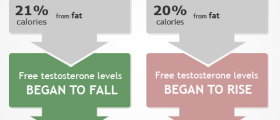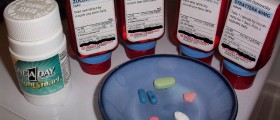
Cells, however, can become insulin resistant. Insulin resistance is a natural process that protects the cell from absorbing too much glucose and "overheating" its metabolic furnaces. The cells of the ovary, however, are never resistant to insulin. They ovaries have to protect the eggs for up to 50 years or more, and they are configured so that they and the brain are absolutely certain to receive blood sugar. When insulin levels go up and most of the rest of the body becomes insulin resistant, the ovaries keep on absorbing sugar. Instead of making a tiny amount of testosterone as they usually do, they start making a lot. This masculinizing hormone is responsible for acne and hair growth. Insulin and testosterone together travel in the bloodstream to the brain, where they stimulate a series of steps resulting in the release of luteinizing hormone (LH).
Many women who have PCOS, especially if they are also diabetic, have high levels of LH all the time. Ordinarily LH acts as a signal to the ovaries that it is time to ovulate. Once ovulation has occurred, other feedback mechanisms ensure that LH levels will go back down. If conception takes place, however, LH levels stay high to make sure the uterus grows in preparation for the implantation of the embryo. The lining of the uterus thickens, and no more eggs are released. In women with persistent high LH levels, they are "hormonally pregnant" without actually conceiving a child. High LH levels make the uterus thicker and thicker, interfering with menstruation, and keep the egg locked inside the fallopian tubes so there is no chance for conception. The simplest way to reverse all these problems is to get insulin levels under control-and that usually involves dieting, not drugs. Up to 90 per cent of women with PCOS who diet for a full 12 months normalize insulin, testosterone, and LH levels so that they are able to conceive.






_f_280x120.jpg)










Your thoughts on this
Loading...